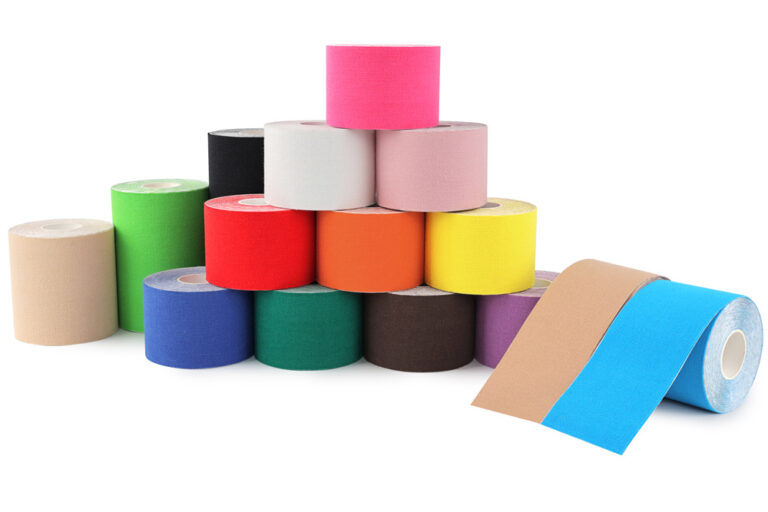Table of Contents
Gymnast tape (aka kinesiology tape) is a therapeutic adhesive that helps with pain and muscle discomfort.
This article provides information on the different types, how to use them, as well as how they can be an asset for athletes of all levels.

What Exactly Is Gymnast Tape?
sport tape is a type of athletic tape that is used to support the muscles and joints of gymnasts.
It is typically made from a stretchy cotton material and is applied in a similar fashion to traditional athletic tape.
Gymnast tape can be used to help prevent injuries, support existing injuries, and improve gymnasts’ performance.
There are many different brands and types of gymnast tape available on the market, so it is important to do some research to find the best option for your needs.
If you are looking for gymnast tape to prevent injuries, you will want to choose a product that provides good support without being too constricting.
For athletes with existing injuries, you will want to choose a product that offers targeted support for the affected area.
And finally, if you are looking for gymnast tape to improve your performance, you will want to choose a product that provides optimal joint support without sacrificing comfort.
When applied correctly, sport tape can be an extremely effective tool for athletes of all levels.
If you are unsure of how to apply the tape, there are many instructional videos and articles available online.
How Does It Relieve Fatigue?
One of the benefits of sport tape is that it can help relieve fatigue. When you are constantly working out and training, your muscles can become very tired and sore.
The tape can help to provide support and stability to the muscles, which can help to reduce the amount of pain and discomfort you feel.
It can also help to improve blood circulation, which can aid in the recovery process.

What Is the Best Way to Apply Gymnast Tape?
There are a few different ways to apply gymnast tape, and each method has its own advantages and disadvantages.
The best way to apply gymnast tape will depend on your individual needs and preferences.
One popular way to apply gymnast tape is the “strip method.” This involves cutting the tape into strips and then applying it to the skin in the desired area.
The advantage of this method is that it allows you to easily customize the size and shape of the strips, which can be helpful if you’re trying to cover a large area or achieve a specific look.
The downside of this method is that it can be time-consuming, and it can be difficult to get the strips to stay in place.
Another popular way to apply sport tape is the “roll method.” This involves rolling out a long strip of tape and then cutting it into smaller pieces.
The advantage of this method is that it’s quick and easy, and it provides a more even coverage than the strip method.
The downside of this method is that you may end up with excess tape if you don’t cut the pieces accurately, which can be wasteful.
The best way to apply gymnast tape will ultimately depend on your personal preferences. Experiment with

When Should You Use Gymnast Tape?
If you’re a gymnast, you know that tape is an essential part of your equipment. But what exactly is sport tape and when should you use it?
Gymnast tape is a type of adhesive tape that is used to secure bandages or pads to the skin. It’s also used to help prevent blisters and provide support for joints and muscles.
You’ll usually find gymnast tape in the first-aid kit at your gym, but it’s also something that you can buy at most drugstores.
So when should you use gymnast tape? If you have a blister or sore spot that you’re worried about, put some gymnast tape on it before your workout.
This will help protect the area and keep it from getting worse.
If you’re having joint pain or muscle cramps, sport tape can also help provide support and relief.
Just be sure to ask your coach or trainer how to apply the tape properly so that it doesn’t interfere with your performance.
When Can’t You Use Gymnast Tape?
There are a few exceptions to when you can’t use gymnast tape. If you have an open wound, the tape will not be able to adhere to your skin.
If you have very sensitive skin, the adhesive in the tape may cause irritation. If you are allergic to latex, many types of gymnast tape contain latex and therefore should be avoided.
Conclusion
Gymnast tape is an essential item for any gymnast, as it can help with a variety of issues.
It can be used to prevent or treat blisters, calluses, and other skin irritations. It can also be used to support weak or injured joints and muscles.
If you are a gymnast, make sure you have some gymnast tape on hand so that you can stay comfortable and safe while you train and compete.



